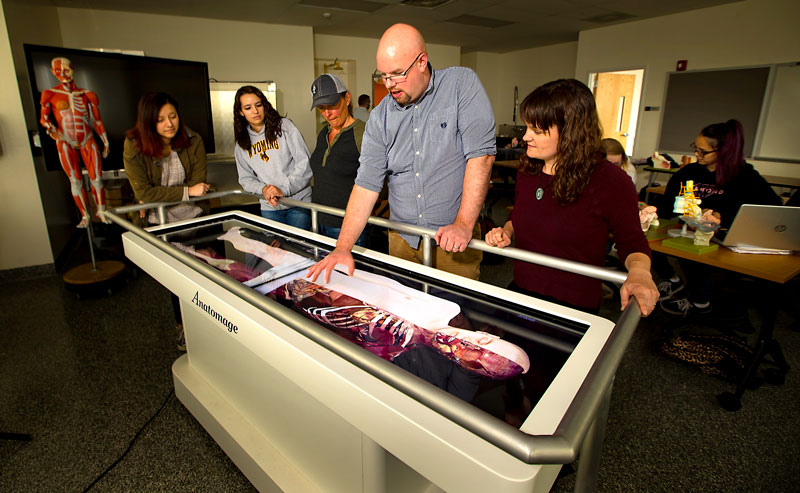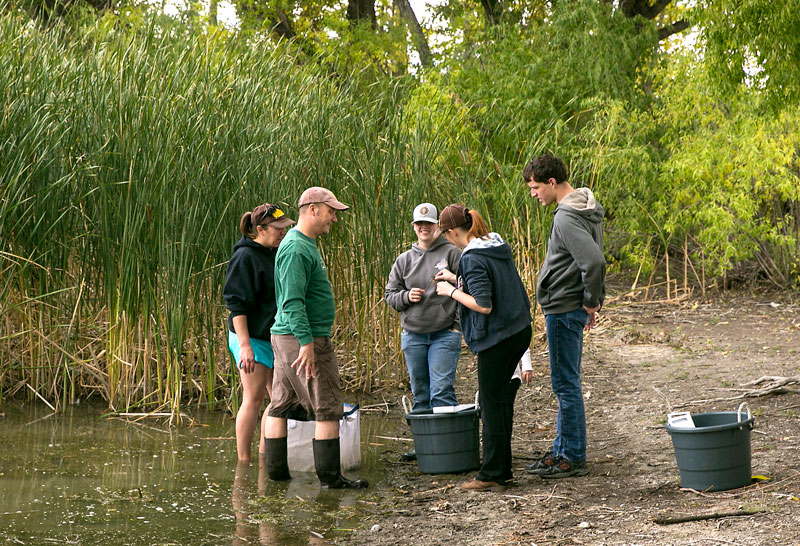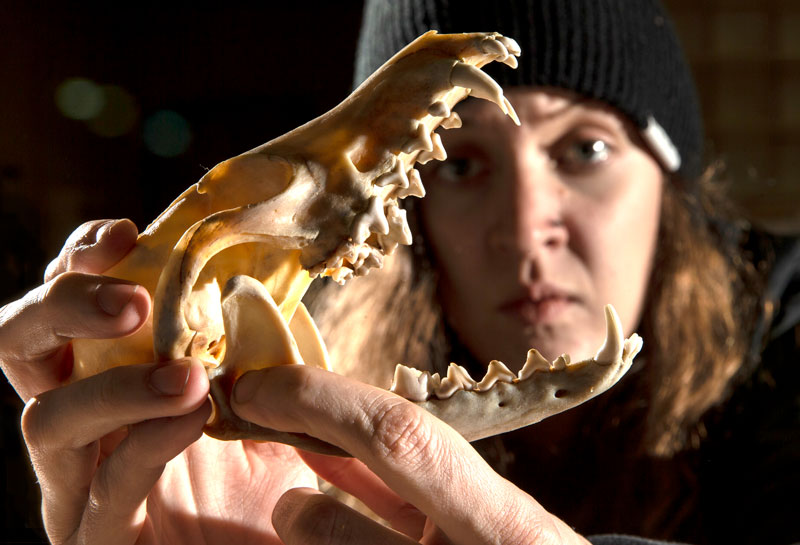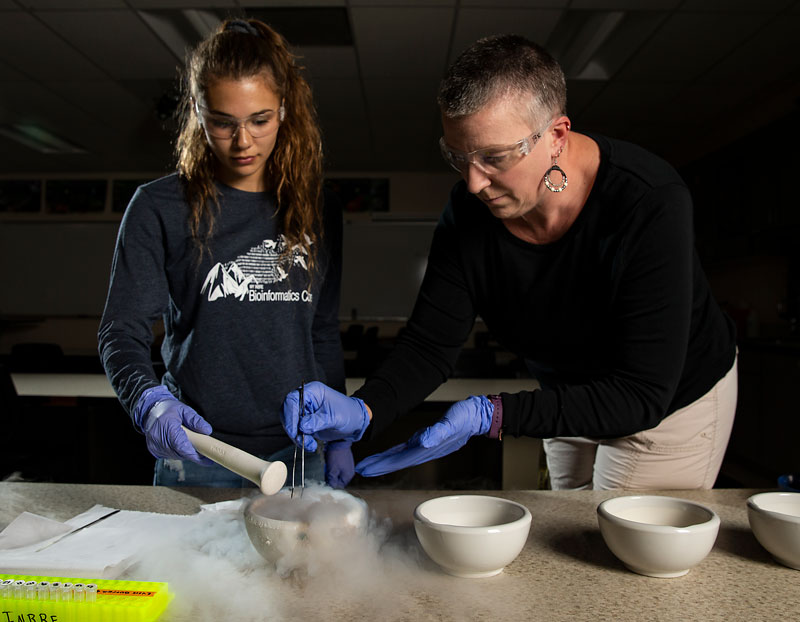Cultivating a Passion




The back wall of Dr. Ami Wangeline's office is blanketed in covers of science magazines. The homemade décor and the shelves full of books on botany and fungi tell a story of the biology instructor's research expertise. Alongside those hardbound books are plastic figurines iconic of her generation and her students'. On her desk sits a dish of toys built for fiddly, fidgeting fingers.
Her enthusiasm for teaching is obvious. It also rivals her passion for science.
LCCC offers a high-quality science education and enables students who are eyeing a four-year degree to move forward in their academic and professional careers.
One of those students is Bert Devilbiss, who was part of a collaboration with Colorado State University while an LCCC biology student in 2012. His passion for mycology—the study of fungi—and a superior performance in an entry level biology course led Wangeline to offer him a position in the LCCC research group and specifically do the fungal identification for the CSU group.
Devilbiss' work lead to a study published last year in the scientific journal Frontiers in Plant Science as original research—an amazing recognition for a student whose research was done at a community college.
The natural science program (with concentrations in biology, chemistry, human biology, molecular biology, physics, physiology, wildlife biology, and zoology) carves opportunity through academic rigors and surprising access to highly specialized equipment.
Of the many resources offered at LCCC, the cadaver and anatomy lab are among the most advanced, including a cadaver table. A 3D virtual anatomy system built to scale, students can "dissect" a cadaver and identify structures and body systems just as they would on a physical cadaver.
The realistic view of the bodies is the result of computed tomography (CT) scans, which makes it possible to see the models in three dimensions as well as examine cross-sectional images.
"This means the table can be used to render and interpret other CT data besides what comes loaded on the table," says zoology instructor Dr. Joshua Schmerge. "Some of the models come with animated sequences to show the movement of specific organs, like the lungs as they expand during inhalation."
The array of equipment offered to students at LCCC is broad, and so is student access.
Take, for example, the school's electron microscope. Or the X-ray fluorescence spectrometer (XRF) used for elemental analysis of plants and animal tissues. Or the confocal suite of microscopes used for increasing optical resolution and contrast of a micrograph.
Electron microscopes render images with high magnification and resolution by employing electron beams in place of light in combination with electron lenses. At a cost of about $450,000, the equipment is well out of reach for small science programs, but Wangeline is a relationship-builder, constructing collaborations with universities and agencies to support her students' growth in the classroom and in life.
That electron microscope came to LCCC through the University of Northern Colorado. When that program saw need for a new microscope, they asked Wangeline to partner on a grant. UNC was awarded its grant, and it needed a new home for its old electron microscope. LCCC eagerly accepted it.
Other pieces of equipment come to the Science Center through the Wyoming Department of Health's Public Health Lab and the Wyoming State Crime Lab, which wants to send its highly specialized equipment to a working lab. Otherwise, it might sit somewhere, uselessly.
Wangeline points to an Isotemp basic—a black upright freezer similar to what shoppers see at appliance stores. It keeps samples, particularly tissues, intact and viable for students' scientific discoveries for a very long time, she says as she points to a skinned bat that's drying in a fume hood. Research samples like these are headed to a museum, and its tissues, which might be of interest to a future student project, are in the Isotemp.
Students drive the LCCC natural science experience they want to have, says Dr. Zac Roehrs, a wildlife biologist by training with a background in genetics and museums. Like Wangeline, he has been part of larger universities' teaching staffs. He, too, prefers the student experience he can influence at LCCC.
"Our biology classes are generally fewer than 24 students, and that fosters a much more direct teaching experience in a community setting," Roehrs explains. "Community colleges are much more focused on the teaching side. What we're about here is really the student."
Unlike four-year institutions, LCCC isn't beholden to research grants, and students aren't tracked into a program because of the institution's need to maintain funding requirements. Rather, the research done by LCCC students is driven by the students themselves. This is an important distinction both for students and the quality of the science education being offered at LCCC.
Take the time three Ph.D. candidates at Colorado State University needed support on analyzing the antioxidant capacity of biological samples with a microplate reader. CSU didn't have the equipment or the expertise. But Wangeline had both, and she trained a student to use the equipment and run the samples.
"At LCCC, students get to do science," she says. "Students who are passionate about science should come here because we are going to train you in science immediately."
In the chemistry instrument lab sits the donated XRF. It was a big win for Wangeline,
who set a personal goal for acquiring one. Through XRF,
analysis can determine the elemental composition of materials, either in a particular
spot or on a larger area, such as a whole leaf.
"We can, and do, design courses in ways that allow for hands-on experience with science," Roehrs says. "We've been building a more inquiry-kind of learning environment."
That's the very idea that led Wangeline to use her sabbatical leave in 2017 to break down the parts of the biology coursework experience and propose a new way for LCCC to engage students in science.
Most students learn science the traditional way—content first, lab experience later.
It's how Wangeline learned science, she says, but she,
Roehrs and fellow instructor Dr. Courtney Springer saw an opportunity at LCCC. Her
revamp of the program was successfully implemented in 2018.
Brett Hopper is one of the first students to benefit from the new approach. He started at LCCC to pursue a career in welding and diesel technology. When a back injury sidelined him, he decided the universe was giving him permission to pursue his dual passions of science and the outdoors.
His current focus in a four-credit lab is researching the RNA of a fungus collected
by Wangeline. He uses a machine to view gels of the genetic
material. Hopper plans to pursue his bachelor's degree at UW or CSU so he can stay
in the region.
The program revamp was possible because of the college's small size, solid relationships with the science community in the region, and the support of the administration in continually developing a high-quality program. But it was also driven by students' experiences: instructors wanted to find a way to better support scientific literacy.
"Ami and I like research; the grants and the things we're doing here help build students," Roehrs says. "That gives us a lot more flexibility."
Indeed, students report that they enjoy the class time more and feel excitement about their futures in science, Wangeline says, noting she's still collecting data from students.
Roehrs says the LCCC natural science program has a great reputation at UW in terms of student preparation.
"We as faculty put a high value on our students doing real science that expands into tangible experiences for them," Wangeline says. "As an instructor, I'm better equipped to do that at LCCC."
